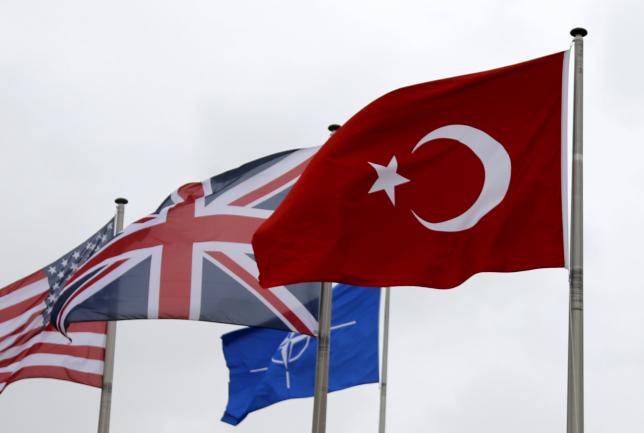US, Turkey weigh which Syrian rebels to support in border area
WASHINGTON: The United States and Turkey have not yet agreed which Syrian opposition fighters they will support in a joint effort to help clear Islamic State from an area along the Turkish border, officials said on Tuesday, underscoring uncertainty surrounding the campaign plan.
Washington and Ankara this week announced their intention to provide air cover for Syrian rebels and jointly sweep Islamic State fighters from a strip of land along the border, with US warplanes using bases in Turkey for strikes.
But planning appears to be just getting under way and resolving crucial details, like which opposition groups will be supported on the ground, could stoke longstanding tensions between the United States and Turkey about Syria strategy.
Also still to be resolved in talks with Turkey, officials say, are how deep into Syria the area might extend and how quickly US warplanes will begin flying combat missions from Turkish bases.
President Barack Obama's administration, wary of being dragged into Syria's messy civil war, has so far struggled to find enough partners on the ground to help claw back territory from Islamic State, relying heavily on Kurdish fighters.
Turkey, in turn, is wary of Kurdish fighters and might be less concerned than Washington about groups with some extremist links or with ambitions to broaden the fight to toppling Syrian President Bashar al-Assad.
"We have to sit down with the Turks and figure it out," a senior Obama administration official said in a briefing with reporters, speaking on condition of anonymity. The official acknowledged there were opposition groups in Syria "we absolutely will not work with."
The U.S. military has so far only trained about 60 Syrian rebel fighters, far below expectations, thanks in part to strict vetting requirements that, for example, weed out fighters whose primary aim is to overthrow Assad.
Derek Chollet, who was an assistant secretary of defence under the Obama administration, said decisions about which groups to support will never be easy and noted longstanding differences between Washington and Ankara over Syria strategy.
"While our cooperation has steadily improved and the urgent crisis seems to have pushed us even closer, our differences are likely masked rather than fully resolved," Chollet, now a senior adviser at the German Marshall Fund, said.
TURKEY AND BORDER ZONE
Robert Ford, a former US ambassador to Syria, said Turkey would likely have the greater say on security arrangements in the zone near its border, partly because of its proximity.
Ford, now at the Middle East Institute, said Washington will not work with Nusra Front, an al Qaeda-linked group that is part of a coalition that he said has received Turkish backing. But as for less hardline Islamist groups, "I guess the administration can live with that," he said.
One group Turkey is not expected to welcome into the zone are the Kurdish YPG militia, which has pushed back Islamic State with the help of US-led air strikes in northern Syria.
Ankara has started striking militants from the Kurdistan Workers Party (PKK) in Iraq in recent days in response to attacks against its police officers and soldiers. But Turkish officials have said Turkish military operations in northern Syria are targeting only Islamic State and not Kurdish forces.






